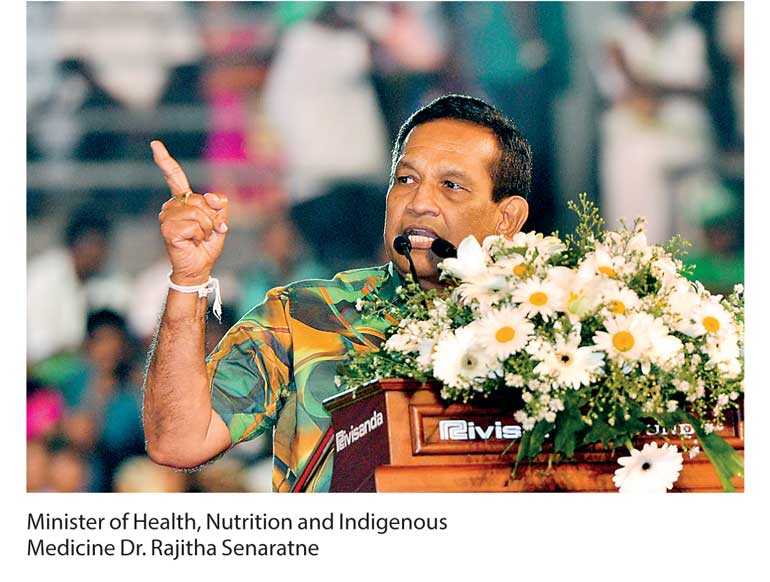Tuesday Feb 17, 2026
Tuesday Feb 17, 2026
Wednesday, 9 May 2018 00:00 - - {{hitsCtrl.values.hits}}
 Minister of Health, Nutrition and Indigenous Medicine Dr. Rajitha Senaratne says discussions have been initiated on setting up of five-day work week for health workers.
Minister of Health, Nutrition and Indigenous Medicine Dr. Rajitha Senaratne says discussions have been initiated on setting up of five-day work week for health workers.
Dr. Senaratne made this revelation when he presided over the May Day rally of the All Ceylon Health Services Union (ACHSU) held on Monday at the union’s headquarters in Maradana, Colombo. Thirteen May Day Resolutions were tabled at the meeting.
Expressing his views at the rally, Dr. Senaratne recalled that he has been with the organisation for 40 years and has held several meetings at the union’s headquarters, coming forward on a difficult journey.
Dr. Senaratne pointed out that many trade unions were destroyed, since those unions got politically involved instead of being trade unions. However, the All Ceylon Health Services Union did not become a victim of such political movements, and therefore no one was able to sabotage the union.
The union came forward as a strong trade union since it works with a new thinking, setting aside the caste, religion and race difference, Dr. Senaratne noted, adding that other trade unions should learn trade union management following the ACHSU as an example.
Dr. Senaratne said the good governance Government increased public servants’ salaries by Rs. 10,000 and it was the highest salary increment in history.
He said that discussions have been launched with regard to setting up of a five-day work week for the health workers, and pay overtime for the other two days of the week.
Dr. Senaratne said he has decided to consider a request made by the union to provide proper training to health service assistants, and extend the training for attendants up to 6 months.
Speaking about education, Dr. Senaratne said the Government has increased the allocation for education and in 2017 alone, the Government has spent Rs. 500 billion and 4.1% of national income has been allocated for education, while 4.2 million school children have been provided with a Rs. 200,000 insurance.
The Government has allocated 3.24% of national income for health services. Many programs have been launched to promote healthcare services, and by the end of this year steps will be taken to manufacture cancer drugs in Sri Lanka.
Noting that people in the country are not aware of the Government’s activities, the Health Minister said hospitals have been provided with a sufficient number of stents needed for heart patients without a shortage now, despite the problems encountered until the program became successful.
Today, 450-500 stent implantations are performed for cardiovascular patients while in 2017 over 10,000 eye surgeries have been performed in the National Eye Hospital.
Dr. Senaratne said steps will be taken to make 4000 casual and substitute employees permanent.
It is very important for the United National Party (UNP) to make progressive decisions at present, Dr. Senaratne said, adding that a new bill will be presented to resolve the SAITM students’ problems.
Pointing out that most of the national income goes to pay the salaries and pensions of the state employees and that it will be a challenge in the future, Dr. Senaratne said steps will be taken to introduce an employee contributory pension scheme.
Dr. Senaratne said he will always work to fulfil requests of the health workers and grant their privileges as health trade unions do not make unreasonable demands.